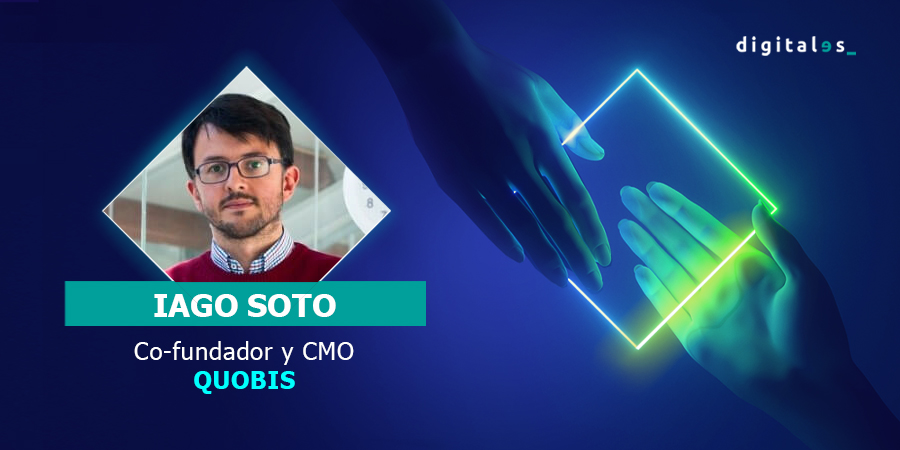07/04/2022
CRACKS of technology’ is a weekly series of interviews, through which we want to give voice to those IT professionals who are absolute geniuses of technology in Spain. We want to hear from them, to know and recognize the work they do in these companies; to know what they are passionate about and what advice they have for those who will come after them.
Today we stop in O Porriño, one of the industrial poles of the metropolitan area of Vigo. The offices of Quobis, a company that provides specialized services and develops technology for the major telecommunications operators in our country, as well as for other large multinational companies, are located here.
At Quobis, they are experts in real-time communications technologies, with which telecoms build part of their solutions portfolio. Founded in 2006, this company has also attracted the attention of major names in the retail sector, industry, banking and insurance, contact centers, emergency services, telemedicine and public institutions…
Who better than Iago Soto, one of its founders, to learn more about this company and its vision for the future of communications.
Iago Soto, co-founder and chief marketing officer (CMO) of Quobis.
Q.- Some people call the Rías Baixas ‘Galifornia’, mainly because of the climate, but Quobis confirms that it can also be a good place from which to build a successful technological business.
A.- (He jokes) There is Internet here too! We decided to found the company in Pontevedra because several factors came together. On the one hand, there was a good telecommunications school in Vigo, one of the oldest in the country. In addition, there were interesting potential clients in Galicia, such as Comunitel, focused on the business world, or the regional operator R Cable (today part of the MásMóvil Group). Both had a relatively innovative profile, because they needed to differentiate themselves from Telefónica, which at that time dominated the B2B business.
This geographic uniqueness has given us a certain advantage as a stable employer in the area. At the moment we maintain a flexible on-site model, which we will probably maintain in the future. Of course, our commercial structure is more dispersed across the map, with part of our sales force based in Madrid, Miami and Mexico.
Q.- It hasn’t rained since 2006! As far as communications is concerned, there was still no iPhone, nor had the smartphone market taken off, nor the industry of IP communications applications that exists today…
A.- The world of communications has evolved a lot, and we have evolved with it. Originally, we worked mainly on voice over IP in architectures based on SIP protocols, to which we have been adding the new possibilities of WebRTC-based communications, including video and real-time collaboration.
Quobis continues to maintain its differential expertise in interconnection, as it is a challenge that involves both WebRTC and SIP infrastructures. Interconnection and communications security go hand in hand, both in corporate communications contexts and with the operators’ own networks.
We currently cover all possible strategies, as we can offer security and interconnection solutions on third-party collaboration platforms, as we are all familiar with, or offer to create UCaaS infrastructures for telcos and large companies to directly provide these services to their users.
Q.- Is there a security threat in enterprise voice, video or collaboration communications, and is this a critical access point for cybercriminals?
A.- Without any doubt. Society is well aware that there are threats related to digital services hosted on web pages. The cyber-attacks most recognized by society are those related to the theft of credentials, the phishingfile hijacking (ransomware), or service failures resulting from a network attack.
Perhaps we are less aware of the threats that exist in voice communications, when there is no screen in between, but the reality is that this form of communication is still predominant in the relationship between companies and individuals, and the possible damages are very similar: data theft, identity theft, blocking of infrastructures…
Attacks on voice networks have been known for many years, even before the advent of voice over IP. Fortunately, technologies exist to combat these threats. For example, encryption systems to prevent the theft of sensitive information in cases of illegal interception of communications.
“Communications infrastructures are strategic elements and that is why they are constantly under attack.”
Communications infrastructures are strategic elements and are therefore under constant attack. Recently we have witnessed, for example, attacks on the physical media themselves, knocking down base stations (antennas) in Ukraine. With the popularization of voice over IP in Spain, about a decade ago, we saw the emergence of another, more sophisticated class of cyber-attacks. Because of our experience in voice interconnection solutions, at Quobis we know how to prevent these risks.
Q.- What kind of security security problems are we talking about?
A.- Firstly, we would find denial-of-service attacks. They consist of launching an avalanche of requests against a server, in this case a voice communications server, which manages to overload the associated infrastructure. SBCs can act as specific firewalls for voice services, guaranteeing the maintenance of the service against these attacks.
Second are threats to the robustness or integrity of the message itself. Here, the best protection is to incorporate encryption that is truly end-to-end, and not just up to a server…
Finally, we could group all types of telephone fraud together. They are very common, no one is safe, even we have suffered from them!
At Quobis we have extensive experience in voice network monitoring, which allows us to also help identify where in the process the security hole took place, and to correct it and attribute responsibilities if it is necessary to do so. In any case, we always recommend a comprehensive and preventive approach to cybersecurity. For us, security is not an option, but an indispensable requirement in order to guarantee the best end-user experience.
Q.- Are the ‘fashion’ digital platforms more insecure than those that can be offered directly by an operator?
A.-The user is sovereign in his choices, and often for convenience he chooses solutions for corporate uses that he has at hand and that are familiar to him, despite not being able to guarantee the minimum security and privacy that may be required in each sector. For example, it is striking to see in the news constant references to exchanges of messages via Whatsapp between ministers, a service that does not even have its infrastructure within our borders and that can offer few guarantees against espionage attempts.
The operators themselves offer business communications services, through very popular UCaaS solutions, because they respond to a real demand that exists in the market and because they already have a more than significant user base, thanks to aggressive commercial strategies.
“For an operator, having its own communications solution has many advantages…also cybersecurity.”
From Quobis, we try to convince operators of the advantages of offering their own solutions, or to try to complement the UCaaS offer, trying to maintain their central role as voice communications providers also in a current unified communications context. This allows them to maintain the visibility of their brand, rather than taking a back seat, by offering functionalities very similar to the platforms mainstream and therefore with a minimal adoption curve, and of course doing it in the safest way and complying with the different regulations that apply in each sector. By default, these communications would run within its own network, on national territory, which facilitates compliance with European regulations, in a Europe increasingly concerned about its digital sovereignty.
Q.- Who is your natural interlocutor within the organizations to which you sell solutions?
A.- The IT department. More specifically, the person or persons responsible for business communications. Most of our customers demand an interconnection solution that is also secure. But there are also companies specifically interested in the security part. In addition to the prevention of external attacks, the motivation of the latter may include compliance with regulations relating to data protection (GDPR) and commercial banking calls, or the achievement of certifications such as ISO 27000.
Q.- Is it necessary to incorporate hardware as well as software?
A.- It depends on the scenario. Keep in mind that, in real-time communications, the delay should be less than 150 milliseconds. Hardware (DSPs) can help to manage traffic over IP more efficiently in environments where many simultaneous calls are made, such as in call centers. In most environments, however, a 100% software solution may be sufficient.
In the last five years, technology has evolved a lot. Today, there are standard tools that allow you to maximize the perceived quality of communications, even if the bandwidth reaching your workstation is not optimal.
Q.- As specialists in digital communications, what is your opinion about movements such as the
Digital Seniors Manifesto
signed by DigitalES?
A.- We agree 100% that we have to offer communication alternatives for all profiles of the population, not only for those most capable of keeping up with the pace of digitalization. In this scenario, the human factor is a clear advantage, and in Quobis we are particularly comfortable with enhancing the human component of communications as opposed to other strategies more focused on replacing people with AIs, bots, etc…
The citizen movement in defense of a more human customer service is perhaps a response to an excessive euphoria to reduce costs through automation. From our point of view, organizations should enable complementary communication channels where the human component is not completely lost. The future law on customer services, in fact, is along these lines.
“Organizations should enable complementary communication channels, where the human component is not completely lost.”
Q.- Finally, in addition to a ‘re-humanization’ of communications, what other trends do you foresee on the horizon?
A.-We believe that 5G will get over the feasibility threshold for new use cases. For example, for video communications in a moving connected car, so that the vehicle can stop if a traffic camera detects a pedestrian on the road.
In short, we are heading towards a world in which we will communicate more, but also better. All the learning of these last years will allow us to take advantage of the technological advances that arrive, to give an immediate and effective response to people… To all people.











